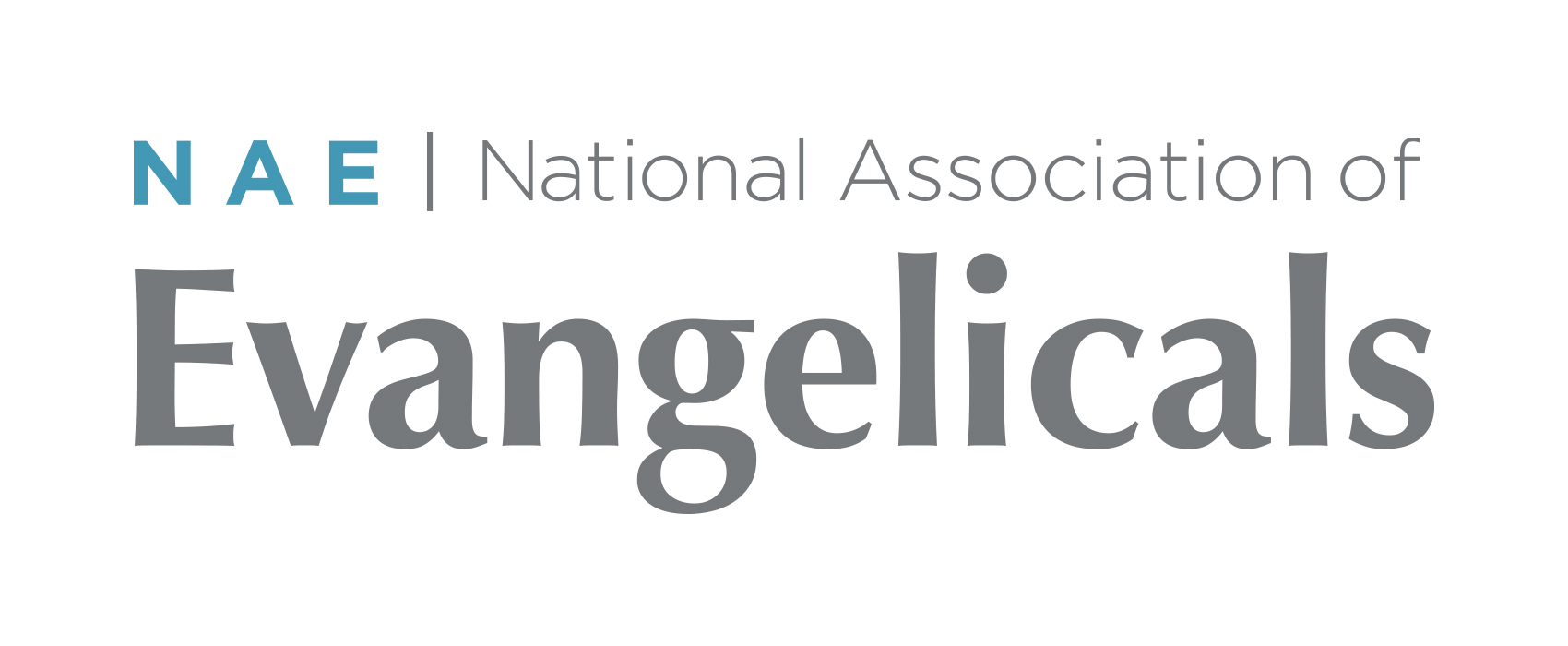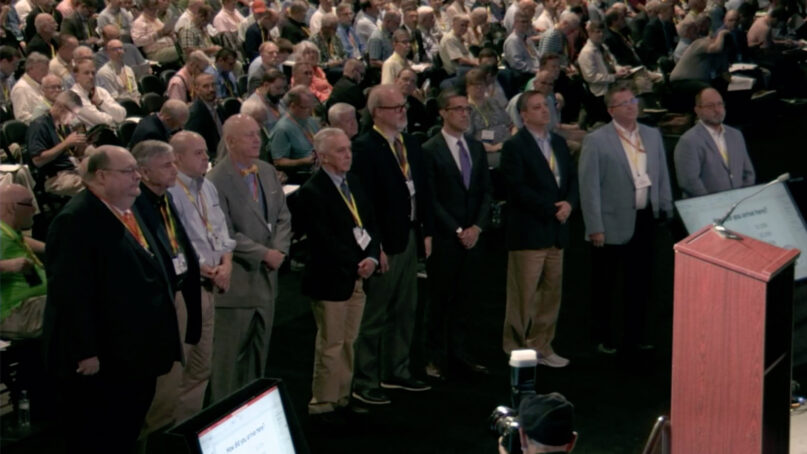(RNS) — Commissioners for the Presbyterian Church in America approved a motion to leave the National Association of Evangelicals on Wednesday (June 22) at the PCA’s General Assembly in Birmingham, Alabama.
It’s the third time in the past decade the theologically conservative Presbyterian denomination has considered a measure to leave the association, an umbrella organization of 40 evangelical Christian denominations.
The decision comes at a time when the head of the NAE serves a PCA congregation. Walter Kim, who took charge of the association in 2020, is a teacher-in-residence at Trinity Presbyterian Church in Charlottesville, Virginia.
Before transitioning to a full-time role with the NAE, Kim was ordained by the PCA and served as pastor for leadership at the church, according to the organization. He maintains his ministerial credentials with the Conservative Congregational Christian Conference.
The National Association of Evangelicals does not comment on denominational decisions, a spokesperson told Religion News Service.
RELATED: National Association of Evangelicals names new president, diverse leadership
At issue, according to the overture submitted by the Pee Dee Presbytery in South Carolina and approved by a 1,059 to 681 majority, is the NAE’s advocacy work.
The NAE has “frequently intermeddled in civil affairs,” according to the overture. It points to a 2011 statement by the association meant to spark discussion on how climate change impacts vulnerable populations, the organization’s past efforts supporting immigration reform and its 2015 change of heart on the death penalty, which it had previously supported.

National Association of Evangelicals logo. Courtesy image
The overture specifically names the Fairness for All Act drafted by the National Association of Evangelicals and the Council for Christian Colleges and Universities. The act calls for federally recognized protections for sexual orientation and gender identity alongside strong religious exemptions.
“Advocating for a political compromise regarding sexual orientation, gender identity, and religious freedom” oversteps the Westminster Confession of Faith, according to the overture. The confession, which was written in the 1600s for the Church of England and later adopted by the Presbyterian Church in America, says “synods and councils are to handle, or conclude nothing, but that which is ecclesiastical; and are not to intermeddle with civil affairs which concern the commonwealth.”
The overture also argues, “Many prominent conservative and evangelical thinkers and leaders have denounced this compromise as not leading to ‘fairness’ for all who uphold biblical teaching on sexuality and marriage, but rather attempts to guarantee religious freedom for some organizations and institutions while potentially undermining the pre-political religious freedoms of all Americans codified in the 1st Amendment of the U.S. Constitution.”

Presbyterian Church in America logo. Courtesy image
Commissioners speaking in support of leaving the National Association of Evangelicals said they were not sure what benefit the denomination received from its membership in the organization. They argued the denomination did not need the association to speak for its members when the General Assembly is the voice of the denomination.
Roy Taylor, former stated clerk of the Presbyterian Church in America, told the General Assembly he planned to file a protest over its decision to leave the NAE.
Taylor argued for the denomination to remain part of the association, urging commissioners to show the same unity as George Whitefield and John Wesley, two prominent ministers in the Church of England during the Great Awakening. While the two held different beliefs on some theological matters, he said, Whitefield regarded Wesley “as a brother in Christ” and stipulated in his will that Wesley preach at his funeral.
“I am a George Whitefield Calvinist. I hope that you are, too,” Taylor said.
RELATED: Presbyterian Church in America leaders say those who identify as gay are not qualified for ordination
===
Presbyterian Church in America leaders say those who identify as gay are not qualified for ordination
Scott Barber, chair of the Overtures Committee, told the elders voting on the overture that its intent is not to exclude Christians who are gay but remain celibate. Still, that’s not the way many opponents of the overture received its approval.
-
Presbyterian Church of America logo, courtesy of
http://www.pcanet.org
July 2, 2021
By Emily McFarlan Miller
--
(RNS) — Pastors and church leaders in the Presbyterian Church in America passed an overture at its General Assembly this week saying those who identify as gay are not qualified for ordination in the conservative Presbyterian denomination.
RELATED: Julie Rodgers shares story of surviving ‘ex-gay’ ministries in new book and Netflix documentary
The overture includes any identity Christians may profess “that undermines or contradicts their identity as new creations in Christ,” though it singles out “gay Christian,” “same sex attracted Christian” and “homosexual Christian” among those identities. The denomination already bars any “practicing homosexual” from ordination.
Overture 23 was overwhelmingly approved 1,438-417 late Thursday night (July 1) at the Presbyterian Church in America’s annual business meeting in St. Louis.
“This has been a hot topic in our denomination, so it won’t surprise you to hear that we spent more time on this overture than any other overture,” Scott Barber, chair of the Overtures Committee, said before the vote.
According to byFaith, the official publication of the Presbyterian Church in America, the final, approved overture read:
“Officers in the Presbyterian Church in America must be above reproach in their walk and Christlike in their character. Those who profess an identity (such as, but not limited to, ‘gay Christian,’ ‘same sex attracted Christian,’ ‘homosexual Christian,’ or like terms) that undermines or contradicts their identity as new creations in Christ, either by denying the sinfulness of fallen desires (such as, but not limited to, same sex attraction), or by denying the reality and hope of progressive sanctification, or by failing to pursue Spirit-empowered victory over their sinful temptations, inclinations, and actions are not qualified for ordained office.”
Barber told the elders voting on the overture that its intent is not to exclude Christians who are gay but remain celibate.
Rather, he said, “What we said is if we use terms like that that undermine or contradict our identity as new creations in Christ, if such an identity becomes higher than our identity in Christ, that would eliminate us from being qualified in the PCA.”
Still, that’s not the way many opponents of the overture received its approval.
Rev. Greg Johnson, Memorial Presbyterian Church lead pastor. Photo courtesy of Memorial Presbyterian Church
Rev. Greg Johnson, Memorial Presbyterian Church lead pastor. Photo courtesy of Memorial Presbyterian Church
“We don’t need to amend our constitution to make a non-affirming denomination (hostile) to gay people who want to follow Jesus in celibacy,” the Rev. Greg Johnson, lead pastor of Memorial Presbyterian Church in St. Louis, said in an email to Religion News Service.
Johnson, who voted against the overture, has previously shared his story as a “gay atheist kid who experienced a conversion to Jesus in college and has joyfully walked with him in celibacy ever since.” His faith hasn’t changed his sexuality in the years since he became a Christian, he said, but it has convicted him to live celibately, following the denomination’s conservative beliefs about sexuality, which reserve sex for between a married man and woman.
The pastor points a finger at the ex-gay movement and conversion therapy, which, while widely discredited in the mental health field, he said continues to shape many evangelicals’ beliefs about and expectations of LGBTQ people. His book, “Still Time to Care: What We Can Learn from the Church’s Failed Attempt to Cure Homosexuality,” releases in September.
“While the ex-gay movement is dead, its cadaver walks about undead among us. Its presence was palpable,” he said.
Johnson doesn’t believe the overture will remove him from ministry, he said. But he does worry about its impact on younger generations, saying their poor treatment of LGBTQ people is the No. 1 reason why young adults leave conservative religious traditions like the Presbyterian Church in America.
“The reigning cultural narrative is that ‘Christians hate gay people.’ By making it even harder for celibate believers to serve the church, this General Assembly has nothing to prove the culture wrong on that point. Quite the contrary. Rightly or wrongly, it will be perceived as a ‘Keep Out’ sign on the church lawn,” he said.
“This is a time to grieve.”
Advocates praised the overture for its consistency with the denomination’s beliefs about sexuality.
Bart Harmon of the Southeast Alabama Presbytery spoke in favor of the overture at General Assembly, calling it “most consistent with the gospel — and because it’s consistent with the gospel, it is by definition compassionate.”
Harmon shared several stories from the biblical accounts of Jesus’ life in which Jesus tells others to give up everything to follow him.
Erick Erickson. Photo courtesy of Erickson’s twitter
Erick Erickson. Photo courtesy of Erickson’s twitter
And on Twitter, conservative Christian commentator Erick Erickson called the overture’s approval “a strong vote for Biblical sexual ethics.”
“Very proud of the elders in St Louis who are standing for orthodoxy against cultural currents,” Erickson tweeted.
To take effect, Overture 23 still must be approved by two-thirds of the denomination’s regional presbyteries and then again by a majority at the next General Assembly, scheduled for 2022 in Birmingham, Alabama.
RELATED: Tim Keller’s new book is not about cancer, but race, justice and resurrection



